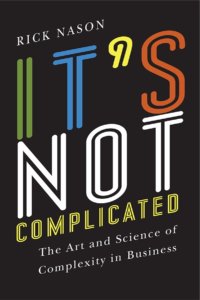MIT Sloan Management Review, June 21, 2017
by Theodore Kinni
 It’s time to call out the real culprit in far too many business failures — Dr. Peter Mark Roget and his insidious thesaurus. Roget is long dead, but his gang of modern-day editors still assert that the words “complex” and “complicated” are synonyms. Unfortunately, as Rick Nason, an associate professor of finance at Dalhousie University’s Rowe School of Business, ably explains in his new book, It’s Not Complicated, if you manage complex things as if they are merely complicated, you’re likely to be setting your company up for failure.
It’s time to call out the real culprit in far too many business failures — Dr. Peter Mark Roget and his insidious thesaurus. Roget is long dead, but his gang of modern-day editors still assert that the words “complex” and “complicated” are synonyms. Unfortunately, as Rick Nason, an associate professor of finance at Dalhousie University’s Rowe School of Business, ably explains in his new book, It’s Not Complicated, if you manage complex things as if they are merely complicated, you’re likely to be setting your company up for failure.
Complicated problems can be hard to solve, but they are addressable with rules and recipes, like the algorithms that place ads on your Twitter feed. They also can be resolved with systems and processes, like the hierarchical structure that most companies use to command and control employees.
The solutions to complicated problems don’t work as well with complex problems, however. Complex problems involve too many unknowns and too many interrelated factors to reduce to rules and processes. A technological disruption like blockchain is a complex problem. A competitor with an innovative business model — an Uber or an Airbnb — is a complex problem. There’s no algorithm that will tell you how to respond.
This could be dismissed as an exercise in semantics, except for one thing: When facing a problem, says Nason, managers tend to automatically default to complicated thinking. Instead, they should be “consciously managing complexity.” In the excerpt that follows, which is edited for space, Nason explains how. Read the rest here.
Thursday, June 22, 2017
The Critical Difference Between Complex and Complicated
Posted by
Theodore Kinni
at
10:37 AM
![]()
Labels: books, change management, corporate success, leadership, management, personal success
Subscribe to:
Post Comments (Atom)















No comments:
Post a Comment